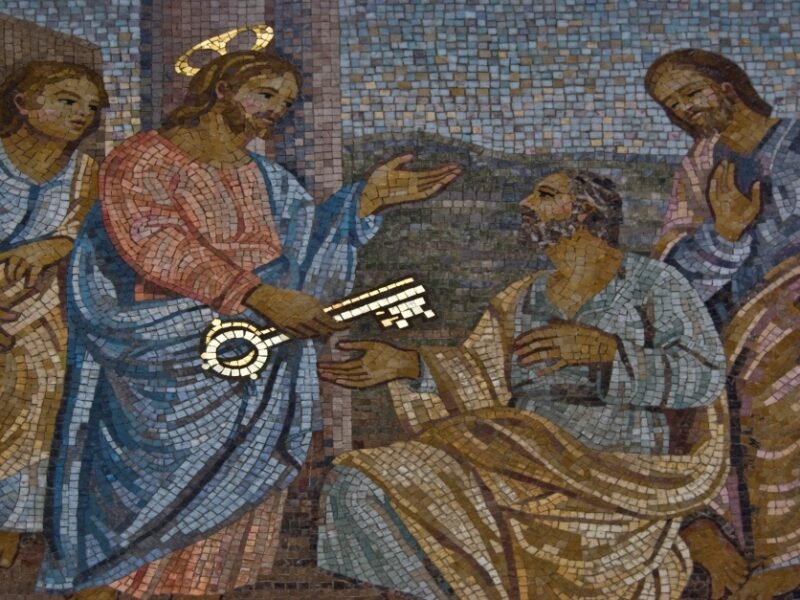As we have seen, Article I affirms God is “without…passions.” To say God is without passions, i.e., impassible, means that
God is not susceptible to being harmed or deprived of any good that is constitutive of his well-being. He is never acted upon so as to become disposed in a manner contrary to his well-being and sufficiency. Thus, he is not subjected to emotional distress like creatures. Instead, God remains constant in his goodness and sufficiency.[1]
If God is impassible, then by definition he cannot suffer. Yet we are told in Article II that Christ, who is “very God and very man,” also “truly suffered.” One possible resolution to this paradox, as noted by Browne, is to hold with the Docetists that Christ only seemed to have a human body, and that in reality he had none and therefore could not suffer. However, this belief has been condemned as heretical since the First Council of Nicaea, making it untenable for Christians today. It may thus appear that the only alternative is the denial of divine impassibility.
Browne is aware of this ostensible contradiction, and he discusses it in his treatment of Article II:
He [Christ] suffered in His human nature, which, being a perfect human nature, was capable of suffering both in Soul and Body. We may not imagine, as has already been shown, that His human nature ceased to be human nature when it was taken by His Godhead; “that the properties of the weaker nature have vanished with the presence of the more glorious, and have been therein swallowed up as in a gulf.” It is true, then, that the Son of God suffered; but not in the Godhead. His Godhead could no more suffer than the Godhead of the Father. But He took human nature, that He might suffer, and in His manhood the Son of God was crucified, and suffered and died.[2]
Here Browne invokes the doctrine known as the communicatio idiomatum, although he does not mention the term by name. This refers to “the communication or sharing of the properties of the two natures in the one person of Christ.”[3] What this means, in brief, is that properties pertaining to only one of Christ’s natures can be applied to the whole person of Christ. Hence, we can rightly say God suffered and died, provided we remember this is true specifically as it pertains to Christ’s human nature.
More could be said about the communicatio idiomatum, but readers who are interested in exploring the topic further may consult the sources cited below.[4]
Notes
- Steven J. Duby, Jesus and the God of Classical Theism: Biblical Christology in Light of the Doctrine of God (Grand Rapids: Baker Academic, 2022), 28. See also James M. Renihan, “What is Impassibility? Defining a forgotten attribute,” Credo Magazine 9.1, 27 March 2019, https://credomag.com/article/what-is-impassibility/. ↑
- See also Paul L. Gavrilyuk, The Suffering of the Impassible God: The Dialectics of Patristic Thought (New York: Oxford University Press, 2004); Michael J. Dodds, The Unchanging God of Love: Thomas Aquinas and Contemporary Theology on Divine Immutability, 2nd ed. (Washington, DC: Catholic University of America Press, 2008), 232‒36; Thomas Joseph White, The Trinity: On the Nature and Mystery of the One God (Washington, DC: Catholic University of America Press, 2022), 292‒307, 643‒48; and Duby, Jesus and the God of Classical Theism, 315‒74. ↑
- Duby, Jesus and the God of Classical Theism, 166. See also Richard Cross, Communicatio Idiomatum: Reformation Christological Debates (New York: Oxford University Press, 2019), 21. ↑
- See John Calvin, Institutes of the Christian Religion II.14.1‒4, trans. Henry Beveridge (Peabody, MA: Hendrickson, 2008), 309‒312; Richard Hooker, Of the Laws of Ecclesiastical Polity V. 52‒53, http://ofthelaws.com/book_5.html#52; Darwell Stone, Outlines of Christian Dogma, 3rd ed. (New York: Longmans, Green, and Co. 1903), 73‒74; Thomas Weinandy, Does God Suffer? (Notre Dame: University of Notre Dame Press, 2000), 172‒213; Thomas Joseph White, The Incarnate Lord: A Thomistic Study in Christology (Washington, DC: Catholic University of America Press, 2015), 19‒21; Timothy Pawl, In Defense of Conciliar Christology: A Philosophical Essay (New York: Oxford University Press, 2016); Francis J. Hall, Anglican Dogmatics: Francis J. Hall’s Dogmatic Theology, ed. John A. Porter, vol. 1, Bk. IV, The Trinity (Nashotah, WI: Nashotah House Press, 2021), 447; Hall, Anglican Dogmatics, vol. 2, Bk. VI, The Incarnation, 24‒25, 75‒76; and R. B. Jamieson and Tyler R. Wittman, Biblical Reasoning: Christological and Trinitarian Rules for Exegesis (Grand Rapids: Baker Academic, 2022), 126‒52. ↑







'Christ’s Suffering in Light of Divine Impassibility [Commentary on Browne: Article II (3)]' has 1 comment
April 1, 2023 @ 4:17 pm Jonjonz, mhfm
Question: How does this, then, not ascribe to Christ an experiential ability NOT shared with the Father?
There seems to arise an enigma from the explanation that requires an explanation.